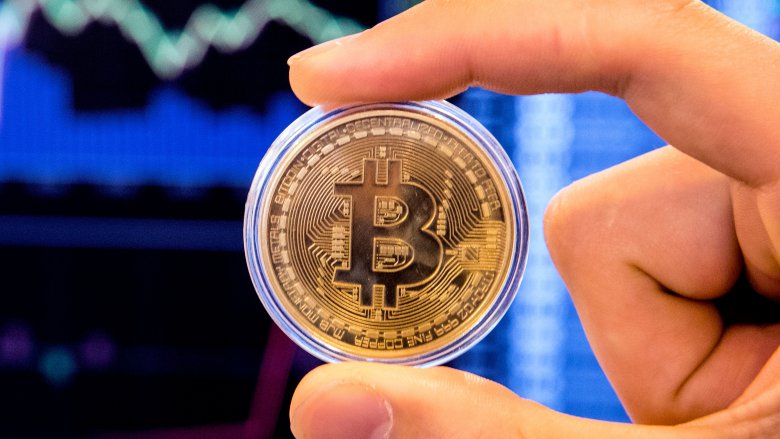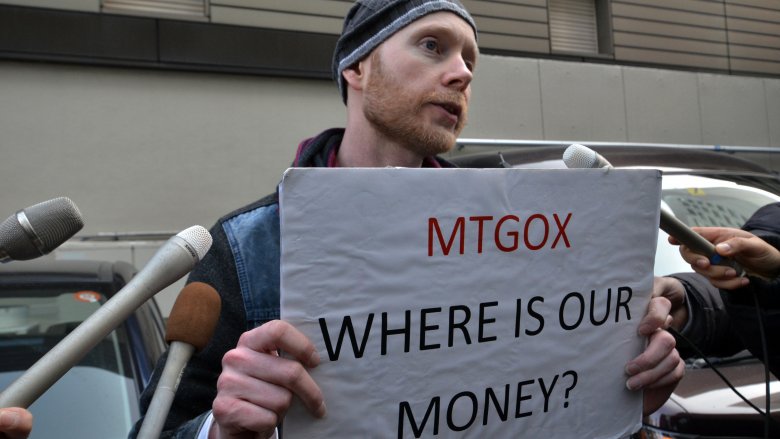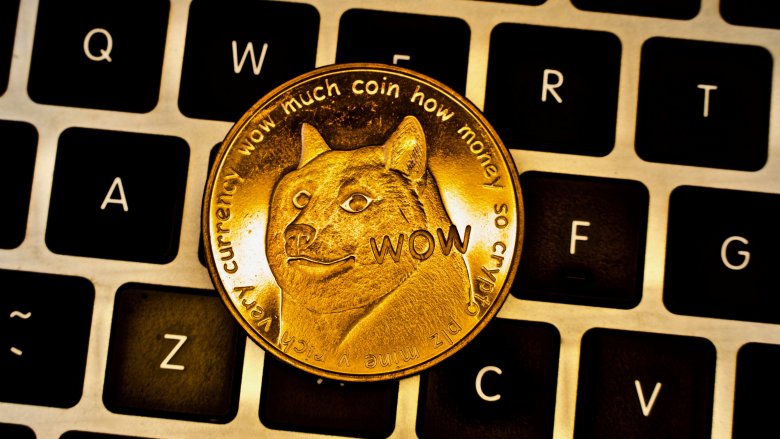The Untold Truth Of Bitcoin
While some of us are still figuring out how to adjust our Facebook privacy settings, everyone and their grandmother seems to be getting in on this juicy digital currency action that's dominating headlines everywhere. People you didn't think even owned a computer are using words like "cryptobroker." Late night talk shows are running skits based around how complicated bitcoin is to explain. Björk is encouraging her fans to use it to pay for her new album, and Lily Allen is expressing regret over not having accepted it as payment a few years ago.
But even if we won't admit it at the risk of seeming hopelessly uninformed, a lot of us are still stuck at the starting gun asking some very basic questions: What exactly is bitcoin and what is actually going on? Should you take out a second mortgage on your home just so you can have a crypto-piece of the crypto-pie? Well no, you probably shouldn't. Just breathe, relax, put down the college tuition, and let's all get a bit more informed before doing something we regret. This little currency that could has had quite the journey so far, but how far can it really go?
An ideological beginning
Before bitcoin started getting tech stock yuppies all hot and bothered by becoming the investment behemoth it is today, it's aspirations were actually much more philosophical and political in nature. After the financial crisis in 2008, it was made abundantly clear that the system we'd all found ourselves in had major flaws, and people were hungry for an alternative. Then, shortly afterward, came bitcoin.
As the New York Times explains, bitcoin's creation was chiefly motivated by a desire to remove the government's control over money and to put that control in the hands of everybody else. With bitcoin, according to its most devoted advocates, everyone who participates in the system is controlling how it works. It can't be shut down, it's anonymous, and you know the currency you're sending is going directly to another person. This attracted a particularly large libertarian and anarchist following early on, and a genuine movement of sorts was born before ultimately being steamrolled by the investment hype machine.
Perhaps more significantly, people were excited at the prospect of being able to move money around the world much more easily. By avoiding banks and wire transfer companies with bitcoin, people sending money overseas would cut down drastically on debilitating fees, not to mention the 2 billion people around the world without bank accounts who could suddenly join the world of commerce. Though not as saucy as, say, the Occupy movement, bitcoin and other cryptocurrencies could theoretically democratize international finance.
Who is Satoshi Nakamoto?
In today's hyperconnected world, everybody knows who everybody is and you can't buy a pair of socks online without the internet figuring out the name of your first crush or what you ate for breakfast. Keeping yourself off the grid entirely seems almost impossible, especially if you're considered in any way high-profile. Yet that's exactly what bitcoin's founder has done.
As outlined by The New Yorker, an academic paper outlining a "peer-to-peer electronic cash system" and containing the first ever mention of bitcoin was released online in 2008, penned by someone named Satoshi Nakamoto. Nakamoto corresponded with other coders and developers and crypto-idealists to help realize his vision, but he always ignored personal questions. In January 2009, Nakamoto announced and released his bitcoin software to the world, and by April 2011 he had essentially vanished. Who this person actually is is anyone's guess, but plenty of people have tried.
Among those suspected — according to Wired — were early contributors Gavin Andresen and Hal Finney, cryptographer Nick Szabo, and a retired engineer named Dorian Satoshi Nakamoto. All have denied it. In 2015, Australian academic Craig Steven Wright actually claimed to be the man himself until skepticism and counter-evidence mounted and he gave up trying to convince anyone. Is the real Nakamoto any of these people? Is he all of them? Is he reading this right now? In any case he may be sitting on billions in bitcoin, so perhaps complete anonymity on his own private luxury yacht/island/planet is the way to go.
Potentially revolutionary uses beyond finance
Bitcoin wouldn't have registered on anyone's radar were it not for its nifty underlying technology, blockchain. As Wired describes it, this is a decentralized ledger that's copied on thousands of computers around the world. Everything is encrypted, and every time a transaction is made the ledger is signed so everything is written down. And every computer in the network knows about it, which prevents unauthorized changes to the ledger.
Before some smoldering Hollywood action stud chimes in with an "English, please?" we'll say this basically means bitcoin users can make untraceable, anonymous transactions without the need for a separate company, like a bank or Paypal, to oversee them. It mitigates the potential for risk and inefficiency because no one needs to trust anyone else — the system is automated and (theoretically) can't be cheated.
This technology isn't limited to financial transactions, and it holds world-altering potential for the future. There are plans to utilize blockchains to transform the worlds of gambling, voting, and social networking, and there's even a blockchain-based electric car charging and billing system being developed in California. Even massive financial institutions like JP Morgan are trying to get in on the action, despite epitomizing the very middle man that bitcoin and blockchain tried to bypass. But while powerful institutions will co-opt these principles to make their existing processes more efficient, the actual blockchain system itself and the political component implanted in it is essentially incorruptible. The potential for meaningful change is always there. In theory, at least.
It all started with pizza
Not all major technological shifts begin with grand, epic gestures destined for front pages around the world. Sure, you have a dog being sent into space and Alexander Graham Bell making the world's first phone call to his assistant on the one hand, but then on the other, consider that the first thing ever bought online was a CD of Sting's Ten Summoner's Tales, back in 1994. That's right, Sting. Bitcoin's weird and wonderful beginnings as a somewhat viable currency are about as humble as you can get.
Way back in the digital days of yore (ages ago, in 2010) bitcoin's value hadn't really been properly determined, and people just kind of convinced other people to sell them things based on how much bitcoin they estimated them to be worth. Often cited as the first real-world bitcoin transaction, software programmer Laszlo Hanyecz paid 10,000 of them to have two Papa John's pizzas delivered to his house. The pizzas were worth about $35, but less than a year later the bitcoin used to buy them could have fetched a tasty $272,329. And because buyer's and spender's remorse soon became the name of the game with bitcoin, Hanyecz was naturally asked by Wired if he regretted not holding on to the coins until they eventually leapt in value. He did not, and apparently "the pizza was really good" in case you were wondering. Gotta respect that.
An underground drug marketplace put it on the map
Early on, bitcoin was probably best known for being able to nab someone a nice gram of Hindu Kush from the comfort of their living room without having to make painful small-talk with their dealer. Founded in 2011 by Ross Ulbricht and only accessible on the dark web via the Tor browser, the anonymous drug marketplace known as Silk Road more or less came to define the cryptocurrency at the beginning of the decade. It took off immediately. A 2011 Gawker piece about the website went viral, and bitcoin's price jumped to $29.60 as a result.
Alex Winter, director of 2015's Deep Web — and Bill of Bill & Ted fame — cites the creation of Silk Road as bitcoin's breakthrough moment, the website's popularity having thrust the currency into the mainstream discourse and putting it on the map in a big way as a usable currency.
Not all bitcoin enthusiasts were all that, well, enthused about the association, feeling that it demeaned the currency and would inevitably attract unwanted scrutiny. Bitcoin escaped the shadow, but its buzz was well and truly harshed when Silk Road was shut down by the FBI in 2013. Ulbricht is currently serving a life sentence in prison. Some argued Silk Road's demise was the real watershed moment for bitcoin though, proving that the currency was not entirely dependent on the site for its value.
It's an ecological nightmare
Money doesn't grow on trees. Neither does bitcoin, but it does essentially grow on the internet. In a process referred to as "mining," thousands of computers around the world process bitcoin transactions and produce the currency by solving really difficult math puzzles. Those providing the computing power are rewarded with bitcoin of their own as an incentive to mine as much as they can, with the total amount capped at 21 million. The puzzles become harder as more bitcoin is mined, so more computers are needed to mine it. Mining requires a veritable butt-load of electricity, and all this electricity is resulting in a carbon footprint the size of a meteor crater.
Grist reports that in December 2017, a single bitcoin transaction used as much electricity as the amount required to power nine homes in the U.S. for nine days, and that by 2020, the bitcoin network will use as much electricity as the entire world does currently. According to Bloomberg, China is the world's largest operator of computer "mines," and about 60 percent of China's electricity comes from coal, so bitcoin is bringing plenty of smog.
It's not all doom and gloom, though. Iceland's mining computers get their energy from geothermal plants, and China did cluster some of its mines around hydroelectric dams. But this is clearly a big problem, and the revolutionary properties of bitcoin are at odds with the potentially catastrophic environmental consequences. Can't exactly change the world if there's no world here to change.
Almost half a billion dollars' worth disappeared in 2014
Before its demise, Mt. Gox was the world's number one bitcoin exchange. As recounted by Wired, the domain was registered in 2007 by American entrepreneur Jed McCaleb and initially intended to be a trading site for Magic: The Gathering cards before he repurposed the site in 2010 as a place where bitcoin buyers and sellers could connect online. McCaleb sold it to French programmer Mark Karpelès in 2011, who more or less ensured the site's doom.
Karpelès was a hopelessly ill-equipped CEO, delaying bug fixes and focusing more on pet projects and telling people about his Mensa membership than actually keeping the site running. But disaster really reared its ugly little head in February 2014, when it was revealed that hackers had been stealing money from the company for years and almost half a billion dollars' worth of people's bitcoins were just gone. Mt. Gox went bankrupt around this time, and most of that money is still missing.
It's been said the community of coders and tech whizzes that ushered in the age of bitcoin didn't have the chops to tackle the business world that awaited them, and Mt. Gox's clumsy downfall lends some credence to that. When a site made to facilitate the trade of an Elven Rider card for a Shivan Dragon is sloppily retrofitted to preside over major financial transactions from around the world, it doesn't take a member of Mensa to see the eggs up ahead just waiting to splatter some faces.
Much imitators. Very currency. Wow.
Bitcoin might still be the belle of the cryptocurrency ball as far as raw numbers are concerned, but it's always been far from a perfect utility. Hindered by prohibitively long processing times and exorbitant processing fees, it was inevitable that alternatives would come along to build on its foundation and try to do what it does, but better. And boy did they come along.
Most altcoins have been sincere attempts at improvement, like Litecoin and Etherium, two of Bitcoin's younger, faster, sleeker and better looking siblings. Others were a little wackier. There's Coinye, for example, a tribute to Kanye West that was abandoned after mounting pressure from the man's legal team, and TrumpCoin, created in late 2016 as a way of showing support for Donald Trump's presidential campaign.
And then there's Dogecoin. Based on a popular meme and created and introduced to the world as a gag currency at first, Dogecoin really struck a chord and soon became quite the scrappy underdoge when its market value rose to around $60 million in early 2014. You can't really buy much with the currency, but it does have some value and became a popular means of "tipping" users online and donating to worthy causes. NPR reported around $30,000 of dogecoin was contributed to help send the Jamaican bobsled team to the 2014 Winter Olympics. The chaotic mess of ingredients that makes up internet culture does cook up the perfect stew sometimes.
Scammers gonna scam
The world of cryptocurrency can be an ethically iffy one, and it's even been suggested that bitcoin itself is a Ponzi scheme at its core, and has been since its inception. But while that really depends on who you talk to, some opportunists stand out for their glaring scumminess and the confidence they most definitely do not inspire. Among these, Bitconnect is king.
Bitconnect was a popular cryptocurrency exchange site that abruptly announced its closure in January 2018, leaving many left wondering where their money went, according to Fortune. Some had invested thousands they were then unable to collect. Bitconnect cited cyber attacks, cease-and-desist letters, and bad press for the shutdown, promising to eventually return any funds people had deposited, but few were convinced. Some fake Bitconnect customer support accounts even started cropping up after the closure in an attempt to scam people out of the money they were trying to retrieve.
Maybe it's just obvious in retrospect, but the footage above of Bitconnect's so-called Annual Ceremony seems so blatant in its dubiousness that it almost feels like a parody, like a Scientology gathering meets an Apple product launch with twice the desperation and half the production value. This, plus other worries, didn't help bitcoin's price — it and other major cryptocurrencies plummeted.
Don't believe the hype?
Flavor Flav and Chuck D's immortal words apply and persist through most walks of life all these years later, but do they hold true for bitcoin? It remains to be seen, but there are plenty of people just waiting for this juggernaut to come to a sudden and unpleasant halt any day now. Like the 2008 global financial crisis, bitcoin could very well be a bubble just on the verge of bursting.
Top economists have claimed that bitcoin resembles your classic speculative bubble, according to The Guardian, citing the volatility of its value as a chief concern and foreseeing a major drop in the near future. They're not wrong about the volatility. The price of bitcoin has been known to swing as much as 20 percent in a single day. Surges in bitcoin's value are usually based on speculation about how much it will be worth in the future, but its actual value will be determined by how likely it really is to be adopted as a widespread medium of exchange, and that just doesn't look like it's going to happen anytime soon. Time will tell, but there are some cash-frenzied investors out there who might be in for a rude awakening and a delayed retirement.









